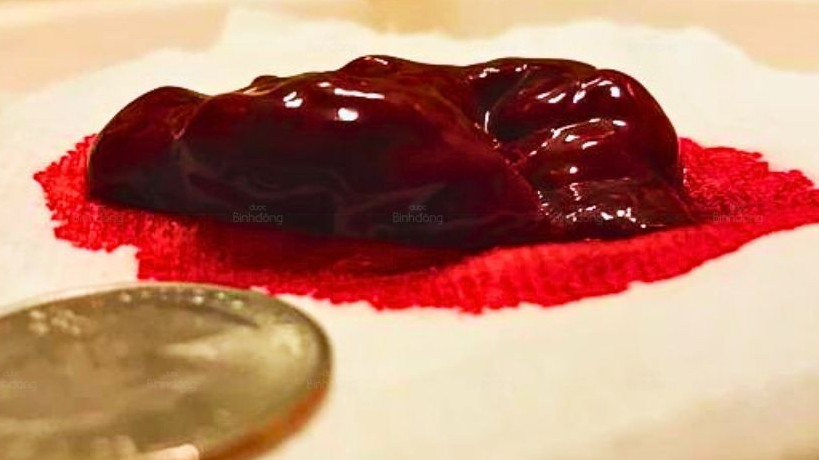Menstrual Clots: Causes, Symptoms, Treatment and Prevention
Menstrual clots are a common phenomenon in many women. This article by Binh Dong Pharmacy will provide detailed information about the causes, symptoms, treatment and effective prevention of menstrual clots.
1. What are menstrual clots?
Menstrual clots are a condition in which menstrual blood is not in liquid form but coagulates into clots of different sizes. These clots are a mixture of blood, uterine lining tissue and clotting proteins. This phenomenon often occurs in the early days of the menstrual cycle, when the amount of menstrual blood is the highest. Menstrual clots can make many women worry, but they are not always a sign of a serious illness.
2. Distinguishing between normal and abnormal menstrual clots
Menstrual clots are not always a worrying sign. It is important to distinguish between normal and abnormal menstrual clots:
Size of the blood clot: Small blood clots (less than 1cm) and infrequent (only on the first day of the cycle) are usually normal. If the blood clots are large (over 2.5cm) and occur frequently, you should see a doctor.
Frequency of occurrence: If menstrual clots only appear on the first days of the cycle, when the menstrual flow is heavy, it is usually not a cause for concern. However, if they last throughout the cycle or appear between periods, it may be a sign of abnormality.
Accompanying symptoms: If menstrual clots are accompanied by symptoms such as severe abdominal pain, menorrhagia (menstruation lasting more than 7 days), anemia (fatigue, dizziness, lightheadedness), you should see a doctor immediately.
3. Causes of menstrual clots
There are many causes of menstrual clots, including:
Natural blood clotting mechanism: During menstruation, the body will produce anticoagulants to prevent excessive blood loss. However, when the amount of menstrual blood is too much, these substances do not have enough time to work effectively, leading to blood clotting. This is the most common cause and is usually not a cause for concern.
Hormonal disorders: An imbalance of estrogen and progesterone hormones can affect the uterine lining and blood clotting, causing menstrual clots.
Uterine fibroids: Uterine fibroids are benign tumors that develop in the uterus. They can change the shape of the uterus and affect uterine contractions, making it difficult for menstrual blood to exit and easy to clot.
Uterine polyps: Uterine polyps are small tumors that develop on the uterine lining. They can cause menorrhagia and menstrual clots.
Endometriosis: Endometriosis is a condition in which the cells lining the uterus grow outside the uterus. It can cause severe menstrual cramps and menstrual clots.
Blood clotting disorders: Some blood disorders can affect blood clotting and cause menstrual clots.
Medication use: Some medications, such as anticoagulants, can affect menstruation.
Early miscarriage: In some cases, menstrual clots can be a sign of early miscarriage.
4. Symptoms of menstrual clots
The main symptom of menstrual clots is the presence of blood clots in the menstrual blood. The size and number of blood clots can vary from person to person. Other symptoms that may accompany them include:
Severe menstrual cramps.
Menorrhagia (menstruation lasting more than 7 days).
Heavy menstrual bleeding (changing sanitary napkins frequently).
Anemia (fatigue, dizziness, lightheadedness).
5. Are menstrual clots dangerous?
In most cases, menstrual clots are normal and not dangerous. However, if you experience the unusual symptoms mentioned above, you should see a doctor for timely diagnosis and treatment.
6. Diagnosis of menstrual clots
To diagnose the cause of menstrual clots, your doctor may ask you about your medical history, menstrual cycle, and symptoms you experience. Your doctor may also perform the following tests:
Gynecological examination.
Uterine ultrasound.
Blood test.
7. Treatment of menstrual clots
Treatment of menstrual clots depends on the cause. Some treatments include:
Pain relievers: To relieve menstrual cramps.
Birth control pills: To regulate hormones and reduce menstrual blood flow.
Hemostatic drugs: To reduce menstrual blood flow.
Surgery: In cases where uterine fibroids, uterine polyps, or endometriosis cause severe menstrual clots, your doctor may recommend surgery.
8. How to prevent menstrual clots
Some measures that can help prevent menstrual clots include:
Healthy diet: Supplement adequate nutrients, especially iron and vitamins.
Regular exercise: Helps improve blood circulation and reduce menstrual cramps.
Reduce stress: Stress can affect hormones and cause menstrual disorders.
Regular gynecological examinations: Helps detect health problems early.
Conclusion
Menstrual clots are common and are usually not a cause for concern. However, if you experience unusual symptoms, you should see a doctor for timely diagnosis and treatment.
Binh Dong Pharmaceutical Company (Bidophar) Information
Here is the contact information for Binh Dong Pharmaceutical Company (Bidophar)
- Address: 43/9 Me Coc Street, Ward 15, District 8, Ho Chi Minh City, Vietnam
- Showroom: 22 Street No. 10, Ward 11, District 6, Ho Chi Minh City, Vietnam
- Hotline: 028.39.808.808
- Suppliers: 028.66.800.300
- Business Department: 028.66.800.100 – 028.66.800.200
- Email: [email protected]
References:
Dược Bình Đông: https://www.binhdong.vn/cam-nang-suc-khoe/cach-dieu-tri-hien-tuong-kinh-von-cuc/
Health: https://www.healthline.com/health/womens-health/menstrual-clots
Advancedgynecology: https://www.advancedgynecology.com/blog/7-potential-causes-for-large-blood-clots-during-your-period










